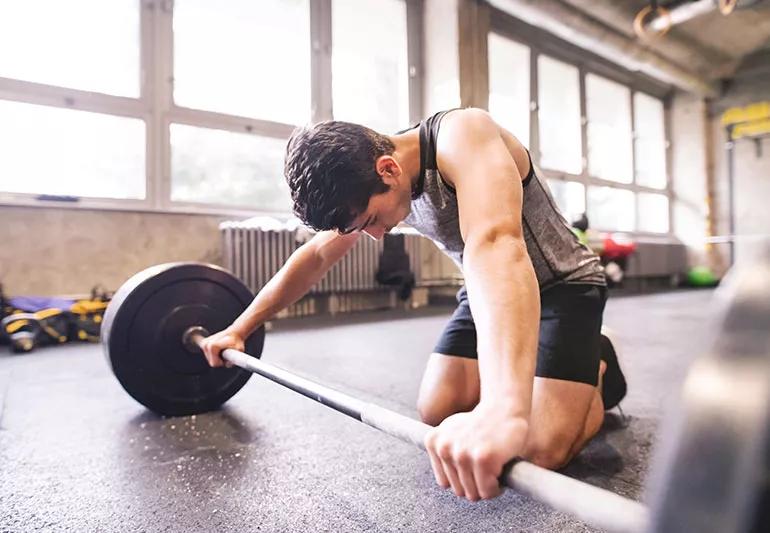Dangers of overtraining + recovery tips

Image content: This image is available to view online.
View image online (https://assets.clevelandclinic.org/transform/0322e2d3-d58e-4acf-84bb-a319834617b4/OverExercising-748340061-770x533-1_jpg)
person kneeling on gym floor while hanging head and gripping a barbell
When you exercise, do you push through the pain? To get stronger, we often set (and re-set) goals involving reps, drills, miles or minutes that can sometimes push us past our limits.
Advertisement
Cleveland Clinic is a non-profit academic medical center. Advertising on our site helps support our mission. We do not endorse non-Cleveland Clinic products or services. Policy
But sometimes, the muscle soreness lingers. You’re exhausted. You just need to push yourself harder, right? Wrong. It’s possible you’re exercising too much. Yes, as the adage goes, too much of a good thing can be bad for you.
“Anybody can be at risk for over-exercising, not just athletes,” says Caitlin Lewis, MD, sports medicine physician.
She outlines symptoms of over-exercising and what to do about them.
Both men and women may enjoy a workout that is more rigorous than a typical exercise session.
You’re out on a pleasant autumn day and your run turns into a 10-miler instead of your usual five miles. The next day is nice too, and you feel pretty good, so you run another eight miles.
This can lead to what doctors call overreaching.
“It means too much exercise in a short period, which is very common and can occur quickly,” Dr. Lewis says.
Symptoms of overreaching include muscle soreness that lasts more than two days (sometimes muscles are swollen, red and warm to the touch). Also, watch out for injury, such as chronic tendinitis or a stress fracture.
Those who continuously push the limits when they exercise run into the more serious condition of overtraining.
This is more common among college athletes, triathletes, ultra-marathoners and other endurance athletes. But if you have a hectic, stressful life and don’t get enough sleep, you are also at risk.
Advertisement
“Sometimes overtraining happens to people who are just starting a program and do too much, too soon,” she says.
Signs of overtraining may include:
Athletes often think they need to train harder if they start gaining weight or if their running times decline or weightlifting loads plateau. “That may end up making the problem even worse,” Dr. Lewis says.
Healing muscles that are sore from overreaching is usually fairly easy. Take a couple days off from exercising and the ache should go away.
“This is quickly correctable with rest,” Dr. Lewis says.
Recovering from overtraining is more difficult and can take at least six to eight weeks of rest.
“I recommend that people work together with their physician, as well as a personal coach or trainer, to gradually return to exercise when safe,” she says.
When you’re ready to resume exercise, a coach may suggest you build in recovery time by taking a day or two off from all exercise every week.
Also, depending on your training program and goals, it may help to cut your exercise by 50% to 80% for an entire week every four to six weeks.
“I think that’s the key thing often missed — an occasional reduction in training volume,” Dr. Lewis says.
Without treatment, overtraining can weaken your immune system and may cause osteoporosis and bone loss in women. In extreme cases, heart damage and rhythm disorders can occur. Those with genetic risk factors are especially vulnerable to cardiac problems from overtraining.
And, those who over train once are at risk for repeat episodes. “Working with an exercise or sports psychologist can help you avoid that,” Dr. Lewis advises.
If there’s a chance you’re exercising too much, it’s a good idea to see a doctor, physical therapist or personal trainer.
“The earlier we intervene, the shorter the recovery,” she says.
Advertisement

Sign up for our Health Essentials emails for expert guidance on nutrition, fitness, sleep, skin care and more.
Learn more about our editorial process.
Advertisement
Goals that are specific, measurable, attainable, relevant and time-bound can support improvement in your health and wellness
Squats are foundational for building strength in your legs, glutes, quads and core muscles
A consistent walking program is an effective way to drop pounds and lose body fat
You can improve your athletic performance over time by breaking up your workout regimen into focused cycles
Lower-intensity workouts can deliver high-quality health and fitness results
Incremental changes in your exercise routine can improve your strength and endurance over time
Understanding heart rate zones can help you tailor your workout to reach your goals
Increase the size of your muscles by bulking up on protein and focusing on slow, intense movements with progressive overloading
Although it could be used as a moisturizer, this new trend is not recommended
Communicating clear limits helps protect your time, energy and emotional well-being
High cholesterol can be genetic, but testing and treatment can lower your heart disease risk